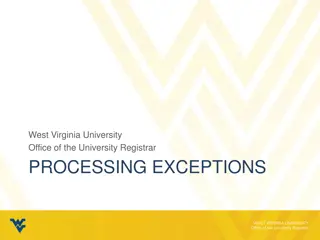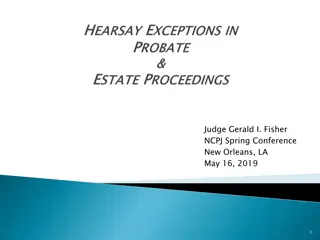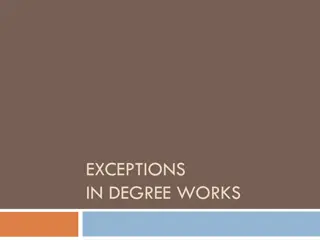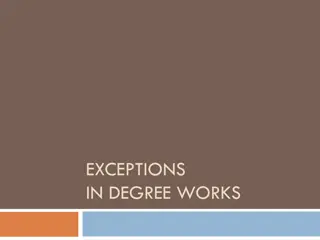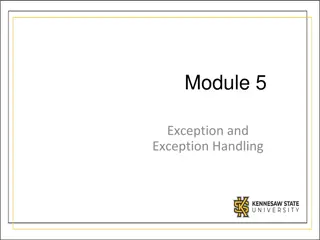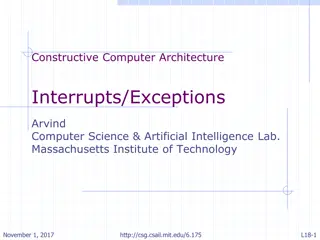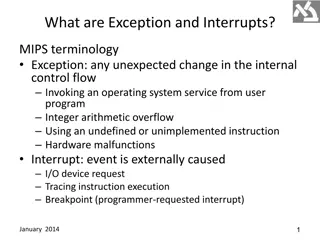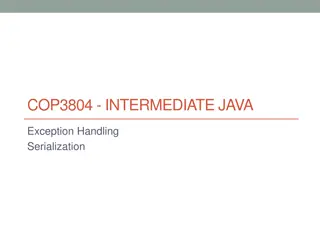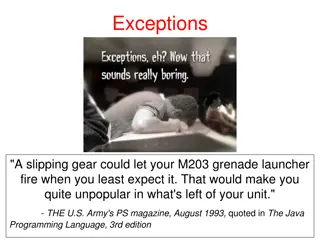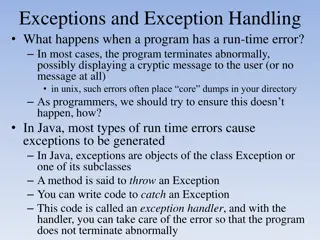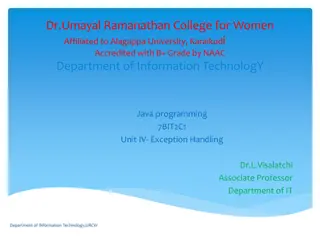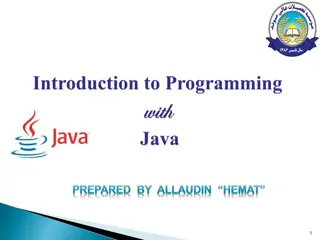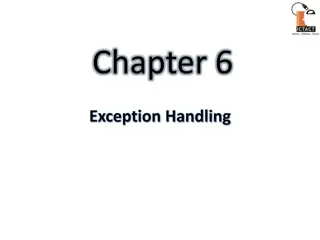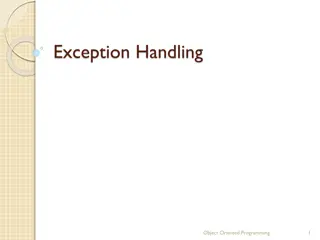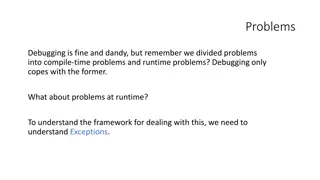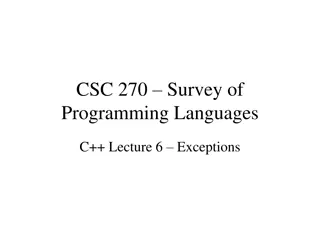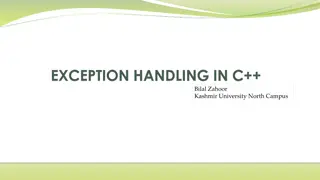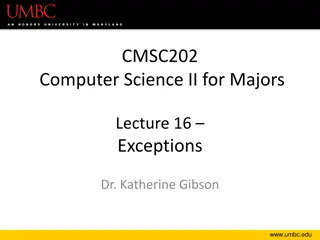
Advanced Exception Handling Techniques in Programming
Explore the importance of exceptions in programming, including error code management, runtime costs, specialized classes, and catch-block matching. Learn how exceptions act as "jumps" and delve into stack unwinding and the evaluation of throw statements, with insights on handling exceptions efficiently.
Download Presentation

Please find below an Image/Link to download the presentation.
The content on the website is provided AS IS for your information and personal use only. It may not be sold, licensed, or shared on other websites without obtaining consent from the author. If you encounter any issues during the download, it is possible that the publisher has removed the file from their server.
You are allowed to download the files provided on this website for personal or commercial use, subject to the condition that they are used lawfully. All files are the property of their respective owners.
The content on the website is provided AS IS for your information and personal use only. It may not be sold, licensed, or shared on other websites without obtaining consent from the author.
E N D
Presentation Transcript
Why exceptions? Returning error codes Throwing exceptions error_code f() void f() { { auto rc1 = g1(); g1(); if ( rc1.bad() ) g2(); return rc1; g3(); auto rc2 = g2(); } if ( rc2.bad() ) return rc2; return g3(); } Run-time cost Run-time cost small if everything is OK none if everything is OK small if something wrong big if something wrong
Exception handling class AnyException { /*...*/ }; Exceptions are "jumps" class WrongException Start: throw statement : public AnyException { /*...*/ }; Destination: try-catch block class BadException Determined in run-time : public AnyException { /*...*/ }; void f() The jump may exit a procedure { Local variables will be properly destructed by destructors if ( something == wrong ) throw WrongException( something); Besides jumping, a value is passed if ( anything != good ) The type of the value determines the destination throw BadException( anything); } Typically, special-purpose classes void g() Catch-block matching can understand inheritance { try { f(); } catch ( const AnyException & e1 ) { /*...*/ } }
Exception handling class AnyException { /*...*/ }; Exceptions are "jumps" class WrongException Start: throw statement : public AnyException { /*...*/ }; Destination: try-catch block class BadException Determined in run-time : public AnyException { /*...*/ }; void f() The jump may exit a procedure { Local variables will be properly destructed by destructors if ( something == wrong ) throw WrongException(); Besides jumping, a value is passed if ( anything != good ) The type of the value determines the destination throw BadException(); } Typically, special-purpose classes void g() Catch-block matching can understand inheritance { try { The value may be ignored f(); } catch ( const AnyException &) { /*...*/ } }
Exception handling class AnyException { /*...*/ }; Exceptions are "jumps" class WrongException Start: throw statement : public AnyException { /*...*/ }; Destination: try-catch block class BadException Determined in run-time : public AnyException { /*...*/ }; void f() The jump may exit a procedure { Local variables will be properly destructed by destructors if ( something == wrong ) throw WrongException(); Besides jumping, a value is passed if ( anything != good ) The type of the value determines the destination throw BadException(); } Typically, special-purpose classes void g() Catch-block matching can understand inheritance { try { The value may be ignored f(); There is an universal catch block } catch (...) { /*...*/ } }
Exception handling Exception handling Evaluating the expression in the throw statement The value is stored "somewhere" Stack-unwinding Blocks and functions are being exited Local and temporary variables are destructed by calling destructors (user code!) Stack-unwinding stops in the try-block whose catch-block matches the throw expression type catch-block execution The throw value is still stored may be accessed via the catch-block argument (typically, by reference) "throw;" statement, if present, continues stack-unwinding Exception handling ends when the accepting catch-block is exited normally Also using return, break, continue, goto Or by invoking another exception
Exception handling Materialized exceptions C++11 std::exception_ptr p; std::exception_ptr is a smart- pointer to an exception object void g() Uses reference-counting to deallocate { try { std::current_exception() f(); Returns (the pointer to) the exception being currently handled } catch (...) { The exception handling may then be ended by exiting the catch-block p = std::current_exception(); } std::rethrow_exception( p) } (Re-)Executes the stored exception like a throw statement void h() This mechanism allows: { Propagating the exception to a different thread std::rethrow_exception( p); } Signalling exceptions in the promise/future mechanism
Exception handling Standard exceptions <stdexcept> All standard exceptions are derived from class exception the member function what() returns the error message bad_alloc: not-enough memory bad_cast: dynamic_cast on references Derived from logic_error: domain_error, invalid_argument, length_error, out_of_range e.g., thrown by vector::at Derived from runtime_error: range_error, overflow_error, underflow_error Hard errors (invalid memory access, division by zero, ...) are NOT signalized as exceptions These errors might occur almost anywhere The need to correctly recover via exception handling would prohibit many code optimizations Nevertheless, there are (proposed) changes in the language specification that will allow reporting hard errors by exceptions at reasonable cost
Exception-safe programming Language-enforced rules Destructors may not end by throwing an exception Constructors of static variables may not end by throwing an exception Move constructors of exception objects may not throw Compilers sometimes generate implicit try-catch blocks When constructing a compound object, a constructor of an element may throw Array allocation Class constructors The implicit catch block destructs previously constructed parts and rethrows
Programming with exceptions basic rules Catch all exceptions in main int main(int argc, char * * argv) { try { // here is all the program functionality } catch (...) { std::cout << "Unknown exception caught" << std::endl; return -1; } return 0; } Motivation: "It is implementation-defined whether any stack unwinding is done when an exception is thrown and not caught." If you don't catch in main, your open files may not be flushed, mutexes not released... Insert a std::exception catch block before the universal block to improve diagnostics in known cases catch (const std::exception & e) { { std::cout << "Exception: " << e.what() << std::endl; return -1; }
Programming with exceptions basic rules Catch all exceptions in main This rule does not apply to threads Exceptions in threads launched by std::thread are caught by the library These exceptions reappear in another thread if join is called [Paranoid] A catch with rethrow ensures stack unwinding to this point try { // sensitive code containing write-open files, inter-process locks etc. } catch (...) { throw; }
Programming with exceptions basic rules Don't consume exceptions of unknown nature You shall always rethrow in universal catch-blocks, except in main Also called Exception neutrality void something() { try { // something } catch (...) { // WRONG !!! std::cout << "Something happened but we always continue" << std::endl; } } Motivation: It is not a good idea to continue work if you don't know what happened It may mean "hacker attack detected" or "battery exhausted"
Programming with exceptions basic rules You can consume an exception if you know what parts may be damaged for (;;) { auto req = socket.receive_request(); try { auto reply = perform_request( req); socket.send_reply(reply); } catch (const std::exception & e) { // Any std::exception deemed recoverable socket.send_reply(500, e.what()); } } The damaged parts must be restored or safely disposed of By their destructors during stack-unwinding (preferred) By clean-up code in rethrowing universal catch-blocks (error-prone)
Programming with exceptions basic rules The damaged parts must be restored or safely disposed of By clean-up code in rethrowing universal catch-blocks (error-prone) try { some_mutex.lock(); try { auto reply = perform_request( req); } catch (...) { some_mutex.unlock(); throw; } some_mutex.unlock(); socket.send_reply(reply); } catch (const std::exception & e) { socket.send_reply(500, e.what()); }
Programming with exceptions basic rules The damaged parts must be restored or safely disposed of By their destructors during stack-unwinding (preferred) Called RAII (Resource Acquisition Is Initialization) try { reply_data reply; { std::lock_guard g(some_mutex); // [C++17] template deduction required reply = perform_request( req); } socket.send_reply(reply); } catch (const std::exception & e) { socket.send_reply(500, e.what()); }
Programming with exceptions basic rules RAII may require additional exactly positioned blocks in code These may interfere with the scope of other declarations try { reply_data reply; { std::lock_guard g(some_mutex); reply = perform_request( req); } socket.send_reply(reply); } catch (const std::exception & e) { socket.send_reply(500, e.what()); } May be solved using std::optional try { std::optional< std::lock_guard< std::mutex>> g(some_mutex); auto reply = perform_request( req); g.reset(); // destructs the lock_guard inside socket.send_reply(reply); } catch (const std::exception & e) { socket.send_reply(500, e.what()); }
Exception-safe programming - theory (Weak) exception safety A function (operator, constructor) is (weakly) safe, if, after an exception, it leaves all the data in a consistent state Consistent state includes: All unreachable data were properly deallocated All pointers are either null or pointing to valid data All application-level invariants are valid Strong exception safety A function is strongly safe, if, after an exception, it leaves the data in the same (observable) state as when invoked Observable state - the behavior of the public methods Also called "Commit-or-rollback semantics"
Exception handling Most parts of standard library strives to be strongly exception-safe In templated code, it depends on the properties of the template arguments Example: std::vector::insert If an exception is thrown when inserting a single element at the end, and T is CopyInsertable or std::is_nothrow_move_constructible<T>::value is true, there are no effects (strong exception guarantee). Before C++11, relocation for block extension was done by copying If a copy constructor threw, the new copies were discarded and the insert call reported failure by throwing Thus, if the insert threw, no observable change happened Note: Correct destruction of copies is possible only if the destructor is non-throwing; however, destructors are non-throwing by default In C++11, the relocation shall be done by moving If a move constructor throws, the previously moved elements shall be moved back, but it can throw again - the result is an unrecoverable situation! The relocation is done by moving only if the move constructor is declared as noexcept
Exception handling Mark procedures which cannot throw by noexcept void f() noexcept { /*...*/ } it may make code calling them easier (for you and for the compiler) noexcept may be conditional template< typename T> void g( T & y) noexcept( std::is_nothrow_copy_constructible< T>::value) { T x = y; }
Exception handling Best practices Default constructor Explicit implementation required if there are scalar elements (numbers, pointers) T() noexcept : /*...*/ {} In most cases, making it noexcept is possible Prefer the ":" section for explicit initialization (usually to 0/nullptr) If all scalar data members are initialized in their declarations, default constructor is not required It is also safer for other constructors class T { int x = /*...*/; U * p = nullptr; /*...*/ }; Other constructors Most non-trivial constructors in non-trivial classes require some allocation Such constructors cannot be noexcept Constructors that do not allocate (including indirectly through containers) may be marked noexcept T( /*...*/ ) noexcept : /*...*/ {} Don't forget to mark single-parameter constructors explicit
Exception handling Best practices Destructor In a class at the base of an inheritance hierarchy, always create a virtual destructor virtual ~T() {} Avoid data elements that need clean-up If clean-up is really needed, remember the Rule Of Five T(T&& b) noexcept : /*...*/ {} T& operator=(const T&& b) noexcept { /*...*/ return *this; } T(const T& b) : /*...*/ {} T& operator=(const T& b) { /*...*/ return *this; } ~T() { /*...*/ } Avoid having more than one element that needs clean-up It often requires a try-catch block when working with more than one element that may fail Pack such data elements one-by-one in auxiliary classes Destructors are by default non-throwing, the noexcept keyword is not used In a destructor, avoid anything that could throw
Exception handling Best practices Move constructor, move assignment Avoid explicit implementation if possible T(T&&) = default; T& operator=(T&&) = default; Do not use noexcept with =default It becomes noexcept implicitly if all elements have noexcept move Scalar elements (numbers, pointers) implement move by copying, considered noexcept Most std library types have noexcept move methods If implemented explicitly, always make it noexcept T(T&&b) noexcept : /*...*/ { /*...*/ } T& operator=(T&&b) noexcept { /*...*/ } Avoid any potentially throwing functionality For scalar elements (numbers, pointers), copy and explicitly set the source to 0/nullptr For class elements, use the ":" section to invoke move constructors The effect on source shall be equivalent to invoking the default constructor
Exception handling Best practices Copy constructor, copy assignment Avoid explicit implementation if possible T(const T&) = default; T& operator=(const T&) = default; Do not use noexcept with =default Exception-safe implementation of copy assignment T & operator=( const T & b) { T tmp(b); operator=(std::move(tmp)); return * this; } Can reuse code already implemented in the copy constructor and the move assignment Correct also for this==&b although ineffective
Exception-safe programming Bezpe n programov n s v jimkami
Strong exception safety void f() void f() { { g1(); g1(); g2(); try { } g2(); When g2() throws... } catch(...) { f() shall signal failure (by throwing) undo_g1(); failure shall imply no change in state throw; } but g1() already changed something } it must be undone NPRG041 Programming in C++ - 2016/2017 David Bedn rek 25
Strong exception safety void f() Undoing is sometimes impossible { e.g. erase(...) Code becomes unreadable g1(); Easy to forgot the undo try { g2(); Observations try { g3(); If a function does not change observable state, undo is not required } catch(...) { undo_g2(); The last function in the sequence is never undone throw; } } catch(...) { undo_g1(); throw; } } NPRG041 Programming in C++ - 2016/2017 David Bedn rek 26
Strong exception safety void f() { Check-and-do style check_g1(); Check if everything is correct check_g2(); Then do everything check_g3(); These functions must not throw do_g1(); do_g2(); Still easy to forget a check do_g3(); Work is often duplicated } It may be difficult to write non- throwing do-functions NPRG041 Programming in C++ - 2016/2017 David Bedn rek 27
Strong exception safety void f() { Check-and-do with tokens auto t1 = check_g1(); Each do-function requires a token generated by the check-function auto t2 = check_g2(); Checks can not be omitted auto t3 = check_g3(); Tokens may carry useful data do_g1( t1); // or t1.doit(); Duplicate work avoided do_g2( t2); do_g3( t3); It may be difficult to write non- throwing do-functions } NPRG041 Programming in C++ - 2016/2017 David Bedn rek 28
Strong exception safety void f() Prepare-and-commit style { Prepare-functions generate a token auto t1 = prepare_g1(); auto t2 = prepare_g2(); Tokens must be committed to produce observable change auto t3 = prepare_g3(); Commit-functions must not throw commit_g1( t1); // or t1.commit(); If not committed, destruction of tokens invokes undo commit_g2( t2); commit_g3( t3); } If some of the commits are forgotten, part of the work will be undone NPRG041 Programming in C++ - 2016/2017 David Bedn rek 29
Strong exception safety Two implementations: Do-Undo Prepare-functions make observable changes and return undo-plans Commit-functions clear undo-plans Token destructors apply undo-plans Prepare-Commit Prepare-functions return do-plans Commit-functions perform do- plans Token destructors clear do-plans void f() { auto t1 = prepare_g1(); auto t2 = prepare_g2(); auto t3 = prepare_g3(); commit_g1( t1); // or t1.commit(); commit_g2( t2); commit_g3( t3); } Commits and destructors must not throw Unsuitable for inserting Use Do-Undo when inserting Destructor does erase Use Prepare-Commit when erasing Commit does erase NPRG041 Programming in C++ - 2016/2017 David Bedn rek 30
Strong exception safety Problems: Some commits may be forgotten Do-Undo style produces temporarily observable changes Unsuitable for parallelism Chained style void f() { auto t1 = prepare_g1(); auto t2 = prepare_g2( std::move(t1)); Atomic commit required Prepare-functions concatenate do- plans Commit executes all do-plans "atomically" It may be wrapped in a lock_guard Commit may throw! It is the only function with observable effects auto t3 = prepare_g3( std::move(t2)); t3.commit(); } Symbolic style void f() { auto t1 = prepare_g1(); Inside commit Do all inserts If some fails, previous must be undone Do all erases Erases do not throw (usually) auto t2 = std::move(t1) | prepare_g2(); auto t3 = std::move(t2) | prepare_g3(); t3.commit(); } NPRG041 Programming in C++ - 2016/2017 David Bedn rek 31


